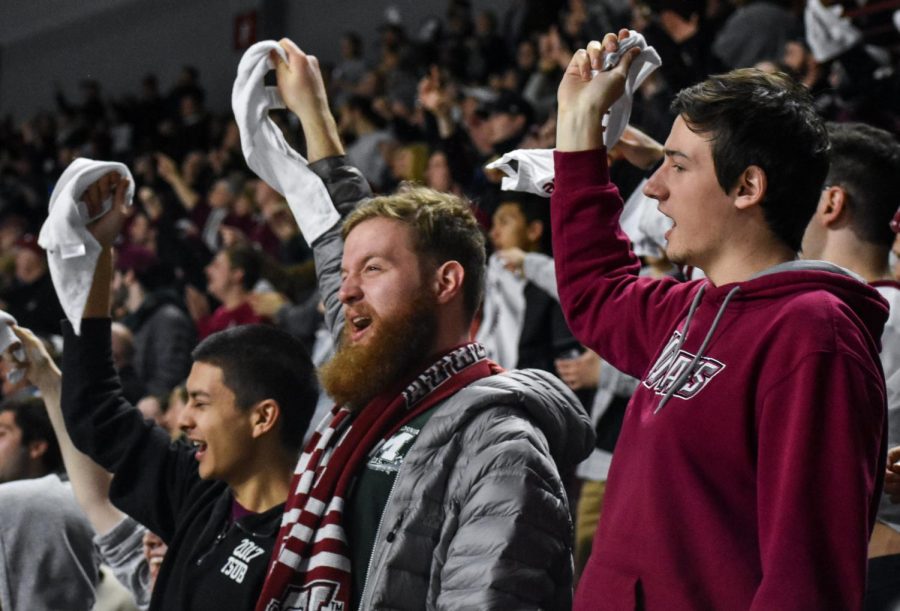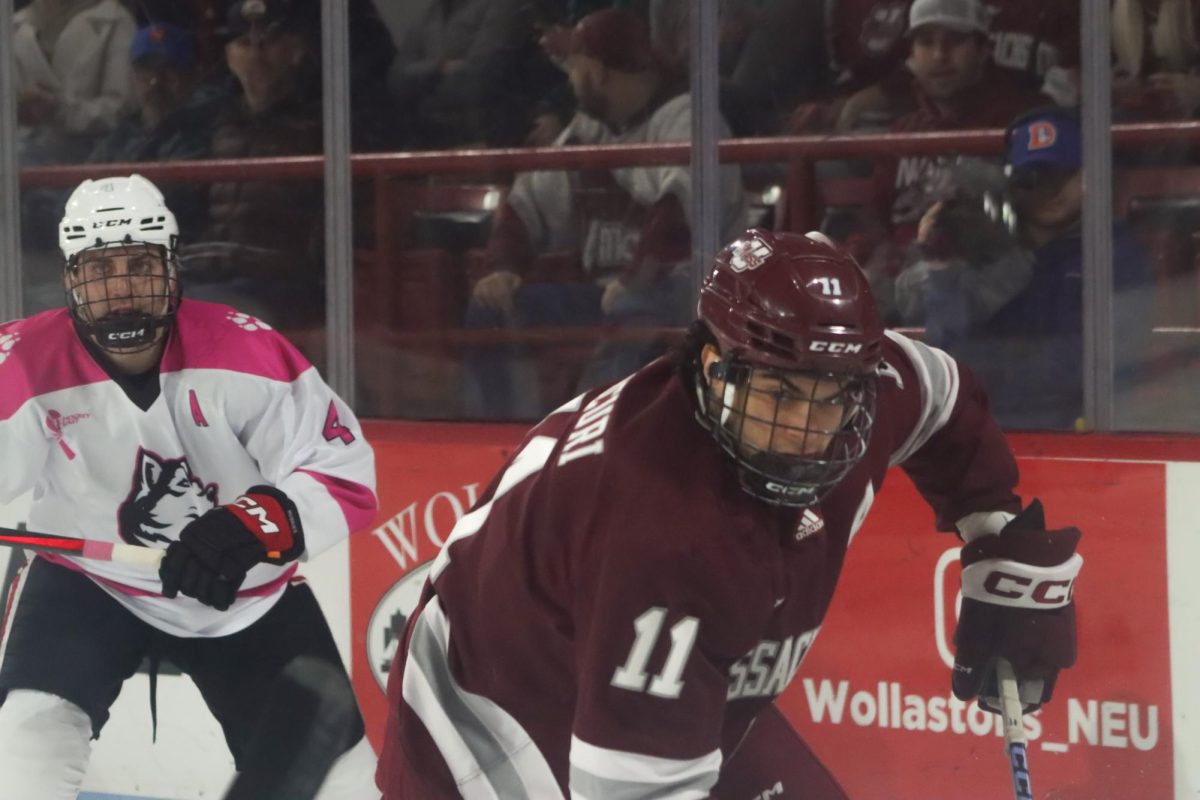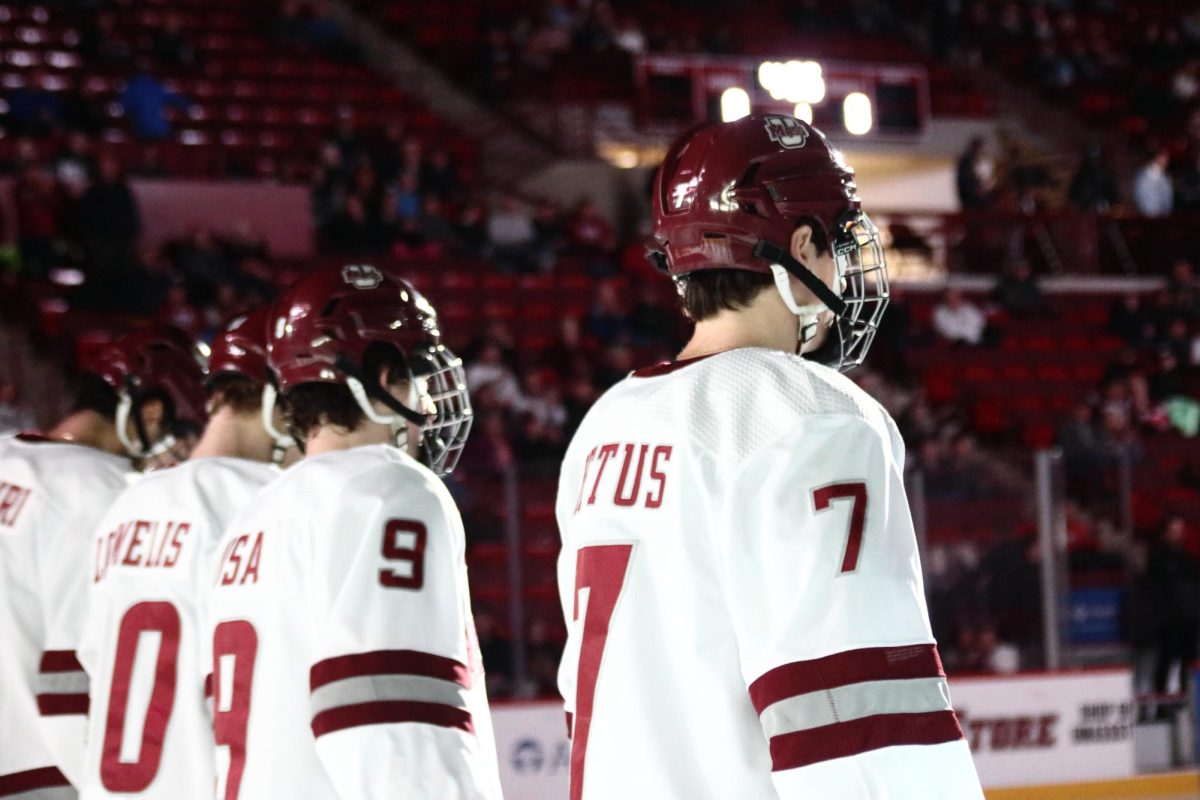First of all: I love the UMass hockey goal song.
No cheering in the press box, basic professionalism, I know: I love that song. I think it’s so fun, it gets the Mullins Center rocking like nothing else in the time I’ve been here and hearing it in Buffalo in April was especially cool. It’s a great chant, and while I’m not going to be singing it in the press box, it’s probably my favorite thing about any UMass gameday experience.
But the underlying song — Gary Glitter’s “Rock and Roll” — just had to go.
UMass Athletics put out a statement on Friday night after the song wasn’t played during UMass’ 5-3 win over RPI, saying that the department “has decided to permanently remove the goal song from our game script at all Minutemen hockey games… and believe that this script change accomplishes our goal of creating a positive game experience for everyone who enjoys UMass hockey.”
The feedback was not great, as fans who’d been upset all night as it hadn’t played were further upset when it was announced that it was gone. That’s totally understandable: it’s a really fun tradition, and one of the few real traditions UMass Athletics has at this point.
One of the common sentiments on Twitter was that the statement didn’t say much by way of reasoning — was it Gary Glitter’s past, or was it the vulgarity of a chant highlighted by the phrase “f— ‘em up, f— ‘em up, go UMass!”
It’s the first one.
Let’s quickly summarize Gary Glitter’s criminal history: in 1997, Glitter’s computer hard drive was found littered with pornographic images of children, with a four-month prison sentence and a place on the sex offender register in the UK coming after he admitted to downloading over 4,000 items of child pornography.
In 2006, Glitter was found guilty of molesting two young Vietnamese girls, aged 11 and 12, and in 2015, he was found guilty of attempted rape — of an eight-year-old girl — four counts of indecent assault and another count of having sex with a girl under the age of 13. He’s presently serving a 16-year prison sentence, a number only lessened by the fact that the crimes occurred between 1975-1980, when the sentencing guidelines were more lenient. Today, that final charge would be classified as rape of a child, and come with a life sentence.
Not exactly the sort of artist you want to be promoting at a college hockey game, and definitely not the sort of artist a public university wants to potentially pay royalties to in order to use his music.
There are plenty of people who are going to call it PC culture run amok and try and draw false equivalencies with other artists with questionable backgrounds — there’s a reason this song doesn’t get played anymore across the world of sports.
There’s a reason why the NFL just about banned it in 2006 — though cover versions continued to persist — and asked teams to avoid even covers in 2012, why the New Jersey Devils and Nashville Predators among other teams have stopped playing it and why the new “Joker” film caught so much backlash for including it.
Child sex abuse crimes fall among the most abhorrent that a human being can commit. Gary Glitter hasn’t just been the subject of multiple allegations; he’s been convicted three separate times of no fewer than nine counts of child sexual abuse, to go along with a litany of other accusations over the years. There’s no gray area here.
If you read the UMass Athletics statement, it doesn’t say a ton. I’m fairly confident that that’s because it wasn’t entirely a UMass Athletics decision. The University doesn’t care about the swearing. Nobody cares about the swearing. The University — and potentially the NCAA — cares about playing a song by one of the most famous convicted pedophiles ever, and generating royalties for him in the process.
The use of House of Pain’s “Jump Around” wasn’t great either, both because of the song’s portrayal of domestic violence and (less importantly) because it just kind of sucks, but the kids sang their usual song anyway. They’re going to sing it anyway. They’re going to tell the opposing goalie he sucks, toss in a few curse words and go on their way. That’s okay, and I’d bet my life that the athletic department couldn’t care less about the vulgarity.
In the last couple of years there’s come a debate about whether or not it’s okay to consume art produced by people ranging from questionable to demonstrably terrible, whether we’re talking about Michael Jackson’s music or Louis C.K’s stand-ups or any movie that Harvey Weinstein helped bring together. That’s a long, complicated argument, that necessitates a lot of time and care and nuance to properly flesh out.
There’s a huge leap between that, and a public university potentially paying royalties to a thrice-convicted child sex abuser so it can use his song at a hockey game.
There exists some uncertainty about whether the presently-jailed Glitter still directly receives royalties, because publishing rights can get real complicated —the LA Times reported that he doesn’t, while other outlets suggest that he does. Truthfully, I think it the change was necessary one way or the other.
Could the band play a cover version? Maybe, but it’s probably a safer bet for the University to just dissociate from it entirely. The reality is that the chant will continue, and at some point they’ll settle on a new song, likely less fun than the original goal song. The communication could’ve been better, but hindsight is always 20/20.
But one way or the other, as much as it sucks and as fun it was, the goal song had to go.
Amin Touri can be reached at [email protected], and followed on Twitter @Amin_Touri.





















Jon H. • Oct 12, 2019 at 9:06 pm
I strongly support the decision to stop playing a pedophile’s song at UMass hockey games. UMass should have abandoned it long ago.
I also very much disagree with the writer of this article that “Nobody cares about the swearing.” There are many families who don’t want to bring young kids to an arena full of adults chanting “F— ’em up.” UMass is responsible for providing students with an education, yet it is also responsible for contributing toward a safe environment for its local community.
If we want good college hockey players in the future, this requires a healthy atmosphere for young hockey fans in the present.